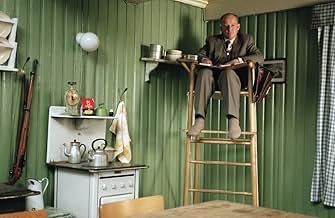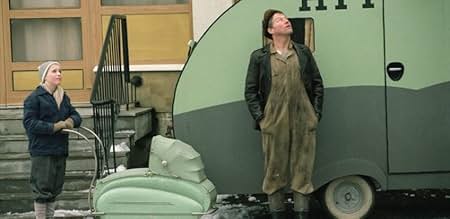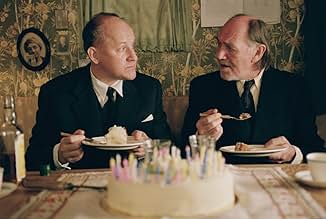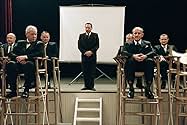AVALIAÇÃO DA IMDb
7,3/10
8,8 mil
SUA AVALIAÇÃO
Adicionar um enredo no seu idiomaA scientific observer's job of observing an old cantankerous single man's kitchen habits is complicated by his growing friendship with him.A scientific observer's job of observing an old cantankerous single man's kitchen habits is complicated by his growing friendship with him.A scientific observer's job of observing an old cantankerous single man's kitchen habits is complicated by his growing friendship with him.
- Direção
- Roteiristas
- Artistas
- Prêmios
- 8 vitórias e 7 indicações no total
Gard B. Eidsvold
- Bakkerman
- (as Gard Eidsvold)
- Direção
- Roteiristas
- Elenco e equipe completos
- Produção, bilheteria e muito mais no IMDbPro
Avaliações em destaque
Having just seen Kaurismaki's dryly-witty `Man Without a Past,' I couldn't believe that director Bent Hamer's `Kitchen Stories' is actually drier and funnier. The Norse/Swedish co-production depicts 1950's Swedes studying bachelors in their kitchens to improve their lives. Swedish scientist Folke, in a high chair like some infantile god, observes Norwegian Isak under the restriction that he must not interact with Isak.
The humor comes from the stereotypical Swede as uptight and organized and the Norwegian as slow but solid. The silliness of the experiment itself is obvious and the restriction ludicrous because of course they will interact, in fact bond, given the loneliness of Norway's winter and the need for humans to be sociable. That the story turns on male bonding is a bonus, especially because neither country is considered a bastion of sociability. When Isak lets Folke listen to the radio on his teeth fillings, I figure the guys are in for some warm nights.
In another way, this film could be as good as it gets for analyzing the effect observers have on their subjects, be it laboratory or media. A question probably unanswerable even today is how much anyone changes under observation. In the case of the central characters in `Kitchen Stories,' the change is considerable, but more so just because of another human being's presence in an otherwise lonely world. The credibility of documentaries and scientists is on the table here.
The minimal dialogue and occasional joke, spiced with subtle racial stereotyping, makes me think of not only Kaurismaki but also Beckett, whose waiting characters sometime talk nonsense, but most of the time profundity under the guise of simplicity. `Kitchen' is a slow but rewarding film that strips life of its pretensions to study more closely the tissue that binds humanity with communication.
Diplomat Dag Hammarskjold in his Markings caught the minimalism of this film: `Friendship needs no words-it is solitude delivered from the anguish of loneliness.'
The humor comes from the stereotypical Swede as uptight and organized and the Norwegian as slow but solid. The silliness of the experiment itself is obvious and the restriction ludicrous because of course they will interact, in fact bond, given the loneliness of Norway's winter and the need for humans to be sociable. That the story turns on male bonding is a bonus, especially because neither country is considered a bastion of sociability. When Isak lets Folke listen to the radio on his teeth fillings, I figure the guys are in for some warm nights.
In another way, this film could be as good as it gets for analyzing the effect observers have on their subjects, be it laboratory or media. A question probably unanswerable even today is how much anyone changes under observation. In the case of the central characters in `Kitchen Stories,' the change is considerable, but more so just because of another human being's presence in an otherwise lonely world. The credibility of documentaries and scientists is on the table here.
The minimal dialogue and occasional joke, spiced with subtle racial stereotyping, makes me think of not only Kaurismaki but also Beckett, whose waiting characters sometime talk nonsense, but most of the time profundity under the guise of simplicity. `Kitchen' is a slow but rewarding film that strips life of its pretensions to study more closely the tissue that binds humanity with communication.
Diplomat Dag Hammarskjold in his Markings caught the minimalism of this film: `Friendship needs no words-it is solitude delivered from the anguish of loneliness.'
How do you make a film
no SELL the idea of a film, whose premise is the following? Take 1950 era Swedish scientists, whose goal is to find men who live alone in the wilderness and study their kitchen habits' at home for the purpose of building a more efficient living space for people. I am sure if any writer walking into Hollywood with that script would be instantly flogged before he even set foot in a studio executive boardroom. A story like this obviously seems to set itself up as a comedy, since the story is so obviously absurd, but what viewers come out with after witnessing this film is the great appreciation and the bonds the characters create. This is a truly touching masterful picture, from a premise that has the most bizarre source that I don't know how anyone could have even come up with. That premise is quite something, since it seems that the idea of studying male behavior in a kitchen in the backwoods of Norway is either going to be a complete disaster or something extremely memorable. Luckily it is the latter of the two. Isak Bjornsson is a scientist out to study a subject' named Folke who lives by himself and has literally no friends. Folke unwittingly is part of this experiment which involves Isak sitting in a giant chair overlooking his living space, as if he was the judge in a tennis match. Also Isak is supposed to follow certain rules set out by his employer. He is not to disturb Folke's living space, nor talk to him. If this isn't a unique bit of Scandinavian humor I don't know what is. If this film were to fall flat or even be just a short funny comedy, it would only fixate on the stupidity of this premise. Somehow a guy who sits in a log cabin miles away from civilization, who can put up with a stuffy repressed scientist whose main purpose is to write excruciating details of a man who literally spends his day doing nothing, is actually quite a funny situation for comedy. Kitchen Stories does not fail in that sense, but the ingeniousness is that Kitchen Stories is smarter than that.
The film suddenly takes the viewer to ask what the real purpose of these 2 men in the movie are and the focus provides and glaring and obvious point. They are essentially both alone in their lives for different reasons and they in a way need each other. But not of course in the sense of a dying love, but in a great sense of male camaraderie and caring that is essential to the idea of a great friendship
Gradually, the bond between scientist and subject breaks down, and both men start evolving a strange set of rules and create a friendship that comes off as the most genuine and heartwarming I've seen on screen since this year started.
As this relationship and some good subplots develop, the comedy takes another turn as Isak tries to hide from his boss ( a man who only dreams' of what the future possibilities of kitchens may look like), that he has engaged his subject in what is obviously, caring' humanity. The nerve!
I loved this film from the moment it started till its tender conclusion. It had only a short run in my area, and even after what must have been several months since I've seen it, I still think about it and a giant smile comes across my face.
It is touching, heartwarming, very funny, and just flat out great. It is the best film I have seen so far this year. If you ever get a chance to see it, go immediately. It shows the perfect beauty of the bond between us all as people, in the most kooky, unique bizarre way. And that in itself is pure genius
Rating 10 out of 10
The film suddenly takes the viewer to ask what the real purpose of these 2 men in the movie are and the focus provides and glaring and obvious point. They are essentially both alone in their lives for different reasons and they in a way need each other. But not of course in the sense of a dying love, but in a great sense of male camaraderie and caring that is essential to the idea of a great friendship
Gradually, the bond between scientist and subject breaks down, and both men start evolving a strange set of rules and create a friendship that comes off as the most genuine and heartwarming I've seen on screen since this year started.
As this relationship and some good subplots develop, the comedy takes another turn as Isak tries to hide from his boss ( a man who only dreams' of what the future possibilities of kitchens may look like), that he has engaged his subject in what is obviously, caring' humanity. The nerve!
I loved this film from the moment it started till its tender conclusion. It had only a short run in my area, and even after what must have been several months since I've seen it, I still think about it and a giant smile comes across my face.
It is touching, heartwarming, very funny, and just flat out great. It is the best film I have seen so far this year. If you ever get a chance to see it, go immediately. It shows the perfect beauty of the bond between us all as people, in the most kooky, unique bizarre way. And that in itself is pure genius
Rating 10 out of 10
This film was a surprise since we went without any preconceptions, having avoided reading about it beforehand. It is a droll attempt at film making by Bent Hamer, the director, who collaborated on the scenario.
The film presents a story that on its surface seems to be one thing, but deep inside there is an ode to friendship between two different, but stoic Scandinavian men, Isak and Folke, whose lives become entwined as they discover how they are similar, despite of all appearances. The story is set in the bleak and snowy Norwegian winter.
In the end, Folke is a better man by having known Isak, the man who he doesn't understand at the beginning of the story, but who unknown to him, was always looking over him, without the other one knowing it.
The three principals are very well portrayed. This film will resonate with people that find themselves alone at the last stages of their lives, and how they are changed by opening up to perfect strangers who are going through the same thing themselves.
The film presents a story that on its surface seems to be one thing, but deep inside there is an ode to friendship between two different, but stoic Scandinavian men, Isak and Folke, whose lives become entwined as they discover how they are similar, despite of all appearances. The story is set in the bleak and snowy Norwegian winter.
In the end, Folke is a better man by having known Isak, the man who he doesn't understand at the beginning of the story, but who unknown to him, was always looking over him, without the other one knowing it.
The three principals are very well portrayed. This film will resonate with people that find themselves alone at the last stages of their lives, and how they are changed by opening up to perfect strangers who are going through the same thing themselves.
As a result of a study in the 1950s in which efficiency experts at the Home Research Institute observed the kitchen habits of Swedish housewives to come up with a better workspace design, eighteen men are transported in caravans to farms in Norway to observe the cooking habits of Norwegian single men. Kitchen Stories, a quirky comedy co-written by Swedish director Bent Hamer and Norway's Jörgen Bergmark, depicts the relationship between two elderly single men, a relationship in which the observer ends up being the observed. The film is similar, in its deadpan humor and offbeat characters, to the work of Aki Kaurismäki, but without the Finnish director's overbearing self-consciousness.
The scientists wear white lab coats and carry clipboards, seemingly poised for an ET-like invasion. The observers, however, must live outside the homes of their subjects in small trailers and are not allowed to talk, drink, or otherwise interact with their subjects. Some, however, are not willing subjects. One of the scientists, Folke, a Swede (Tomas Norström), draws Isak (Joachim Calmeyer), an antisocial Norwegian farmer used to living in solitude. Isak at first refuses to let Folke into his house, resentful that the horse he was promised in return for his participation turned out to be a figurine. Folke, however, eventually gains access to the kitchen and sits every day perched in his high observation chair, recording Isak's every movement like the Lord High Executioner until Isak decides to take his hot plate up to his bedroom to frustrate his unwelcome guest.
The sly Isak drills a hole through the upstairs bedroom floor and now secretly watches Folke in the kitchen. When they start conversing, each man insists on speaking his own language (not shown by the subtitles) as if to doggedly maintain their separate identities. Gradually they become friends, breaking through the barriers in their life that have imposed a limiting solitude. They begin first by drinking coffee in the morning, sharing a bit of their background, and then celebrating Isak's birthday with cake and bourbon whiskey. Their interaction, of course, is against the rules of the study, and there are consequences for Folke. His life, however, acquires new meaning the more willing he is to take risks and share himself openly. Kitchen Stories is a small film, but one that is warmhearted and thoroughly enjoyable, a work that celebrates the small pleasures in just being alive without trying to be profound or seduce us with blatant emotional appeals.
The scientists wear white lab coats and carry clipboards, seemingly poised for an ET-like invasion. The observers, however, must live outside the homes of their subjects in small trailers and are not allowed to talk, drink, or otherwise interact with their subjects. Some, however, are not willing subjects. One of the scientists, Folke, a Swede (Tomas Norström), draws Isak (Joachim Calmeyer), an antisocial Norwegian farmer used to living in solitude. Isak at first refuses to let Folke into his house, resentful that the horse he was promised in return for his participation turned out to be a figurine. Folke, however, eventually gains access to the kitchen and sits every day perched in his high observation chair, recording Isak's every movement like the Lord High Executioner until Isak decides to take his hot plate up to his bedroom to frustrate his unwelcome guest.
The sly Isak drills a hole through the upstairs bedroom floor and now secretly watches Folke in the kitchen. When they start conversing, each man insists on speaking his own language (not shown by the subtitles) as if to doggedly maintain their separate identities. Gradually they become friends, breaking through the barriers in their life that have imposed a limiting solitude. They begin first by drinking coffee in the morning, sharing a bit of their background, and then celebrating Isak's birthday with cake and bourbon whiskey. Their interaction, of course, is against the rules of the study, and there are consequences for Folke. His life, however, acquires new meaning the more willing he is to take risks and share himself openly. Kitchen Stories is a small film, but one that is warmhearted and thoroughly enjoyable, a work that celebrates the small pleasures in just being alive without trying to be profound or seduce us with blatant emotional appeals.
When I picked up this DVD, I noticed two prominent words on the front--"Hilarious" and "Funny". After seeing the film, I think these are both completely inappropriate descriptions of the film. So, of course, some advertising idiots decided to promote this as a hilarious comedy, even though this did not appear to be the intention of those who made the movie! There are a few mildly funny moments, but it just isn't a comedy. Instead, it's a slight slice of life film about a Swedish company that prides itself on scientifically investigating EVERYTHING there is about kitchens. The story centers on one of their studies which is done with Norwegian bachelors. They decided to send observers into these kitchens and passively watch and record the movement patterns of these men. The observers and observed are under strict orders NOT to interact in any way.
This story centers on one home. At first, the bachelor doesn't want to even allow the observer in the home. Then, once he begrudgingly lets him in, their relationship is pretty tense. However, over time it is natural that a bond is created between them. The acting is good and the story generally pretty compelling. Not a bad little unusual film, but for some reason the writers decided to end the movie on a down note--I can understand the choice, but don't agree with it at all.
This story centers on one home. At first, the bachelor doesn't want to even allow the observer in the home. Then, once he begrudgingly lets him in, their relationship is pretty tense. However, over time it is natural that a bond is created between them. The acting is good and the story generally pretty compelling. Not a bad little unusual film, but for some reason the writers decided to end the movie on a down note--I can understand the choice, but don't agree with it at all.
Você sabia?
- CuriosidadesAt the beginning of the film, Malmberg (a Swede) becomes ill after having to drive on the right side of the road in Norway. Today both countries drive on the right. In 1967, Sweden switched to the right because making two versions of cars like Volvos and Saabs for domestic and foreign sales was inefficient. Also, there are many unguarded, unmarked border crossings points (unlike the crossing in the film); people would not realize which country they were in and sometimes ended up driving on the wrong side.
- ConexõesSpoofed in Brødrene Dal og mysteriet med Karl XIIs gamasjer: Episode #1.1 (2005)
- Trilhas sonorasVisa Från Utanmyra
Performed by Jan Johansson
Principais escolhas
Faça login para avaliar e ver a lista de recomendações personalizadas
- How long is Kitchen Stories?Fornecido pela Alexa
Detalhes
Bilheteria
- Faturamento bruto nos EUA e Canadá
- US$ 351.235
- Fim de semana de estreia nos EUA e Canadá
- US$ 48.103
- 22 de fev. de 2004
- Faturamento bruto mundial
- US$ 2.823.472
- Tempo de duração1 hora 35 minutos
- Cor
- Mixagem de som
- Proporção
- 1.85 : 1
Contribua para esta página
Sugerir uma alteração ou adicionar conteúdo ausente




























